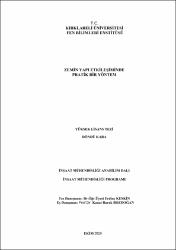Zemin Yapı Etkileşiminde Pratik Bir Yöntem

Göster/
Erişim
info:eu-repo/semantics/openAccesshttp://creativecommons.org/licenses/by-nc/3.0/us/Tarih
2019-10-16Üst veri
Tüm öğe kaydını gösterKünye
Kara, D. (2019). "Zemin Yapı Etkileşiminde Pratik Bir Yöntem", Yüksek Lisans Tezi: Kırklareli Üniversitesi Fen Bilimleri Enstitüsü.Özet
Zayıf zemine oturan yapıların deprem yer hareketi etkisi altındaki davranışının belirlenmesinde zemin yapı etkileşiminin dikkate alınması önemlidir. Bu tez çalışmasında Türkiye Bina Deprem Yönetmeliği kapsamında yer alan 5 farklı zemin sınıfı üzerine oturan yapıların dinamik davranışı incelenmiştir. Bu amaçla düzlem çerçeve ve perde–çerçeve yapı örnekleri ele alınarak, her iki taşıyıcı sistem türü için zemin yapı etkileşimi dört farklı model kullanılarak incelenmiştir. Çalışmada özellikle zeminin kabuk elemanlarla modellenmesine alternatif olarak kullanılabilecek, zeminin çubuk elemanlarla ve basitleştirilmiş yaklaşımlarla modellenmesinin uygunluğu araştırılmıştır. Bu tez çalışması kapsamında özgün olarak perdeli yapılar için iki pratik model geliştirilmiştir. Geliştirilen birinci model yapı özelliklerinin yapı yüksekliği boyunca değişebilmesine ve aynı şekilde zemin özelliklerinin tabakalar boyunca değişebilmesine imkan verirken, geliştirilen ikinci model yapı ve zemin özelliklerinin üniform olduğu sistemler için geçerlidir. Çalışmada geliştirilen modeller ile serbest titreşim analizi yapılarak periyotlar daha kısa bir sürede belirlenmiştir. Sunulan yöntemler ile özellikle klasik sonlu elemanlar yönteminde artan eleman sayısı ile birlikte gözden kaçan zemin yapı etkileşimi davranışının daha az parametre ile anlaşılması mümkün olmaktadır. Çalışmanın birinci bölümü giriş mahiyetinde olup ikinci bölüm daha önce literatürde konu ile ilgili yapılmış çalışmaları içermektedir. Üçüncü bölümde Kırklareli ilinin deprem tehlikesi belirlenmiştir. Dördüncü bölümde kısaca zemin yapı etkileşimi anlatılmıştır. Beşinci bölüm ise çalışma kapsamında geliştirilen yöntemler ile yapılan analizleri içermektedir. Analizlerde SAP2000, MATLAB ve SCILAB programları kullanılmıştır . It is especially important to take into account the soil-structure interaction in the determination of the behavior of the structures resting on soft soils under earthquake loads. In this thesis the dynamic behavior of structures resting on 5 different soil types according to the Turkish Seismic Code (2018) were studied. For this purpose, planar frame and wall-frame structure samples were taken and the the soil structure interaction for both carrier system types was examined using four different models. In this study, the suitability of modeling of soil with rod elements and simplified approaches, which can be used as an alternative to modeling of soil with shell elements, was investigated. Two practical models have been developed for shear wall structures. The first model allows the building properties to vary along the height of the structure, and the soil properties can also vary across the layers, while the second model applies to systems in which the structure and soil properties are uniform. Free vibration analysis was performed with the models developed in the study and the periods were determined in less time. With the presented methods, it is possible to understand the soil structure interaction behavior that is overlooked with the increasing number of elements in classical finite element method with less parameters. The first part of the study is introductory and the second part includes the previous studies about the subject in the literature. In the third section, earthquake hazard of Kırklareli province is determined. In the fourth chapter, soil structure interaction is explained briefly. The fifth chapter includes the analysis of the methods developed in the thesis. SAP2000, MATLAB and SCILAB programs were used in the analyzes.
Koleksiyonlar
- Tez Koleksiyonu [88]
Aşağıdaki lisans dosyası bu öğe ile ilişkilidir:



















